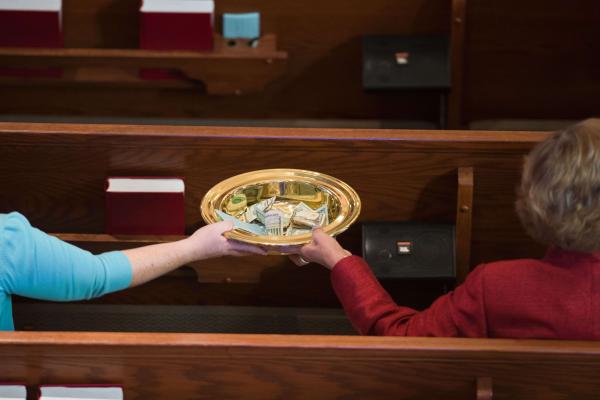Every once in a while, a new scandal in the United States shines a spotlight on the tax-exempt status that religious institutions enjoy in this country. In 2019, a whistleblower alerted the IRS that the Church of Jesus Christ of Latter-day Saints had stockpiled about $100 billion in accounts that were originally intended for charitable purposes. The Church of Scientology’s revenue and investments are so notorious that even former President Donald Trump questioned the legitimacy of its tax-exempt status. There are numerous examples of religious institutions abusing COVID-19 relief funds that arguably should have never been available to them in the first place. Finally, the Catholic Church’s scandals — from the settlements paid out to victims of child abuse to a pair of nuns embezzling $835,000 and gambling it away in Las Vegas — are reason enough to consider revising the tax-exempt laws in the United States.
With or without a scandal, this year’s tax season provides another occasion to ask just how fair this system really is. Tax codes are notoriously complex, but for those who are new to the topic, it’s enough to understand that religious institutions benefit from an array of exemptions, both at the state and federal levels. They pay little to no taxes on their properties, and little to no capital gains taxes on their investments. Thanks to a parsonage exemption, payments to employees are often untaxed. Institutions can collect income tax-free, unless that revenue is part of a distinct, for-profit venture. And of course, donors can write off their contributions.
Maybe I could live with all that if religious institutions applied for tax-exempt status like a regular nonprofit. But they don’t. While secular nonprofits must demonstrate that they spend their income on their mission, religious institutions are under no such obligation. Money can go in and then, without exaggeration, simply disappear.
What is important to understand is that churches, mosques, synagogues, and other religious institutions enjoy these benefits simply because they are religious and not because of any charitable work they do. That’s not to deny the many charitable activities that they perform. But unlike secular nonprofits, religious institutions are not required to account for such activities. The IRS performs no oversight of them, and it does not enforce penalties on institutions that opt out of charitable work.
Many spokespeople for organized religion continue to argue that the exemption is an inalienable right. They tend to view reform as an attack on either their “religious liberties” or their charitable efforts. Thanks in part to the scandals mentioned above, a growing number of people are challenging these arguments, with many of them responding to the latest controversies by insisting that religious institutions be taxed immediately.
I admit that if you catch me on a bad day, I might join the chorus demanding that the government take aggressive action. As a former Catholic, I often contemplate how the law may have helped the Catholic Church hide its crimes against children. But in an effort to find some common ground, my position simply is that religious institutions should have to earn the exemptions in the same way that secular nonprofits do. This means that they would have to show how much money they bring in and how they spend it.
No matter how diplomatically I phrase that proposal, the same objection arises every time: Sure, pastors like Joel Osteen may be raking in the cash, but what about those smaller institutions serving less privileged communities? Wouldn’t they be harmed by a more stringent set of rules?
Unfortunately, the short answer to that question is probably “yes.” Any change in the law would probably have a disproportionate, adverse effect on less wealthy institutions because that’s the way our society is rigged. After all, in a 2019 report published by ProPublica, the IRS admitted that it often audited poor people because it’s easier than going after the rich. I’m not thrilled at the prospect of the IRS investigating a smaller religious institution in a historically disadvantaged community while Osteen's lawyers shield him from scrutiny.
That said, I can't help but notice two premature and contradictory assumptions at work here. The first assumption, found in multiple defenses of the current law, is that, if the exemption were lifted, small institutions would end up owing a lot in taxes because it would be such a huge burden for them to demonstrate that they are legitimate nonprofits. Of course, defenders of the status quo could say: “Okay, give us a chance to be transparent, and we'll show you that we collect our revenue fairly, and we spend it honestly.” But I don’t hear that very often. Instead, supporters of the exemption immediately skip any pretense that religious organizations can reliably show that they spend their money on their mission. At the very least, it should raise our eyebrows when an institution known for serving the poor claims that their revenue and expenses are too complicated to report, especially when secular nonprofits serving those same communities have somehow managed this feat.
The second assumption is that smaller organizations are somehow “better” than Osteen's — that they’re serving their communities better, they’re doing more charity work, and they’re less abusive and less manipulative. I'm not prepared to assume any of that. Doing so begs the very question that only transparency can answer. The complex issue of how much good religious institutions do in society is very much up for debate. So too is the simpler question of how much money goes into these organizations and what exactly comes out.
Imagine, for example, a network of churches that spends a million dollars a year on charitable activities. Proponents of the exemption would point to that as evidence that the tax code is working. “Look at all that money!” they would say. “That’s more than your secular nonprofits!” But that million-dollar figure is worthless unless we know how much money the church collected. If they took in 50 million dollars, then their charity work — a mere 2 percent of their revenue — looks less like a mission and more like a front.
This hypothetical is more common than most people realize. Legal scholar Chad J. Pomeroy notes in a 2019 article for the Oklahoma Law Review that megachurches on average spend less than a quarter of their income on missions and programs, with several — like the Catholic Church and the LDS Church — spending less than three percent. In a 2013 article from Cardozo Law Review, legal expert John Montague argues that the law incentivizes the concentration of wealth with no accountability, both in large institutions and in smaller ones. One could dispute those findings, which is exactly why transparency is so badly needed.
Even some conservative Republicans have acknowledged this open secret. Back in 2007, Sen. Chuck Grassley (R-Iowa), acting as the chairman of the Committee on Finance, demanded that six “media-based ministries” disclose some of their finances. It could have been a first step toward reform, but many of the churches he contacted never complied, and it’s difficult to imagine someone like Grassley making a similar demand in today’s culture war climate. Regardless, an opaque institution that harvests money would be a net negative for the community it claims to serve. And that’s leaving aside the harmful activities often linked to religious organizations, from COVID-19 denial to anti-LGBT bigotry to white nationalism.
Still, I don't want to dismiss concerns about taxing religious institutions entirely. Here is another point where we can frame the conversation better: Opponents of tax-exempt status would be wise to come up with ways to allow religious organizations a safe landing if the law were to change.
With that in mind, I think the reform should be implemented gradually. Religious organizations could be granted a few initial exceptions, especially for very small institutions. They could also receive a generous grace period — perhaps up to several years — to show that they are spending their revenue on their mission rather than squirreling it away or using it to buy their elders a new yacht. If an organization can't get its act together by then, it probably deserves to be taxed. Or go out of business.
There’s a bigger picture to contemplate here, and it has to do with how we run a functional, compassionate society. A tax code that allows any institution — religious or not — to hoard money with no oversight should be considered a structural injustice. At the same time, an overreliance on religious institutions as charities discourages a more comprehensive system of direct aid and investment from government entities. (You know, the kind of social safety net that other stable democracies take for granted.) If an organization claims to stand for justice, yet continues to support this tax system, we must at least ask a few follow-up questions. The public discourse is already upon us, and it might get ugly. We can either leave it to the angriest voices in the room, or we can work out a fair solution.
Got something to say about what you're reading? We value your feedback!






